August 1, 2025
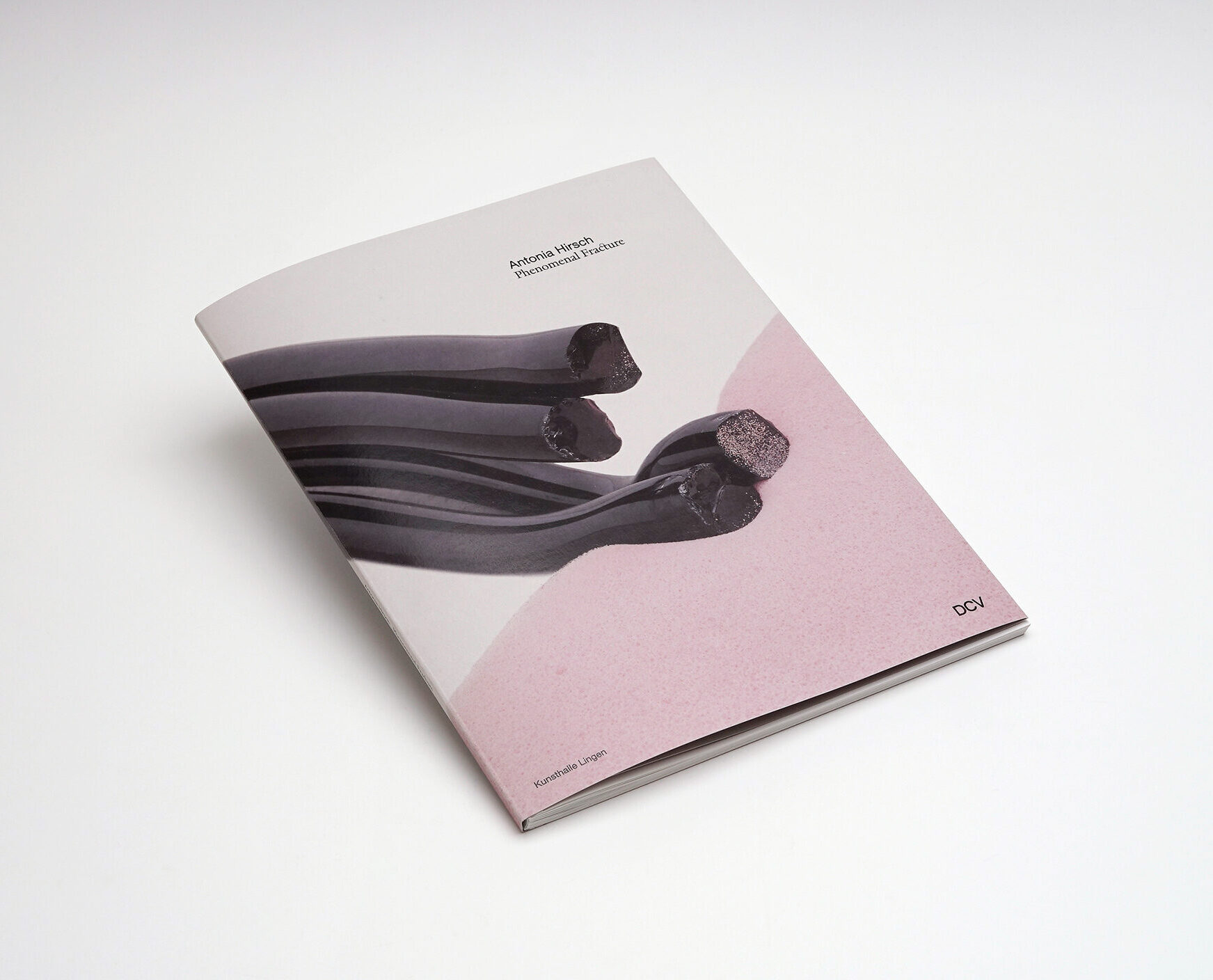 Phenomenal Fracture is out! The book documents my solo exhibition Phenomenal Fracture at Kunsthalle Lingen (2024). With an essay by Meike Behm and exhibition photography by Roman Mensing. Designed by Adeline Morlon and published by DCV Books, Berlin.
Phenomenal Fracture is out! The book documents my solo exhibition Phenomenal Fracture at Kunsthalle Lingen (2024). With an essay by Meike Behm and exhibition photography by Roman Mensing. Designed by Adeline Morlon and published by DCV Books, Berlin.
Antonia Hirsch
January 2, 2025

Search Engine by Antonia Hirsch launches at Miss Read on January 11, 6pm!
Antonia Hirsch will be in conversation with Dr. Gill Partington and the book’s editor Jayne Wilkinson, focusing on the book’s central feature: the index.
Antonia Hirsch
September 5, 2024
 Search Engine by Antonia Hirsch launches at Art Metropole on September 8, 2pm!
Search Engine by Antonia Hirsch launches at Art Metropole on September 8, 2pm!
Antonia Hirsch and editor Jayne Wilkinson will present the book in conversation, focusing in particular on the book’s central feature: an index acting as a poetic meta text to Hirsch’s practice.
Antonia Hirsch
August 25, 2024

Search Engine launch at READ Books in Vancouver: Antonia Hirsch in conversation with Libby Leshgold Gallery Director/Curator, Vanessa Kwan.
Antonia Hirsch
June 5, 2024

Search Engine is out! The publication comprises an extensive image section (212 illustrations), texts by Henriette Huldisch and Katharina Rein, a conversation between Elena Filipovic and me, and an introduction and glossary, also by me. Edited by Jayne Wilkinson. Designed by Derek Barnett. Published by Information Office, Vancouver.
Go to “Publications” for more details and to order.
Antonia Hirsch
April 25, 2024
 Sunday, April 28, 2024 at 4.30 pm
Sunday, April 28, 2024 at 4.30 pm
Conversation between director of Kunsthalle Lingen, Meike Behm, and Antonia Hirsch.
Antonia Hirsch
March 19, 2024
 Antonia Hirsch
Antonia Hirsch
June 22, 2023

 Antonia Hirsch
Antonia Hirsch
May 14, 2023
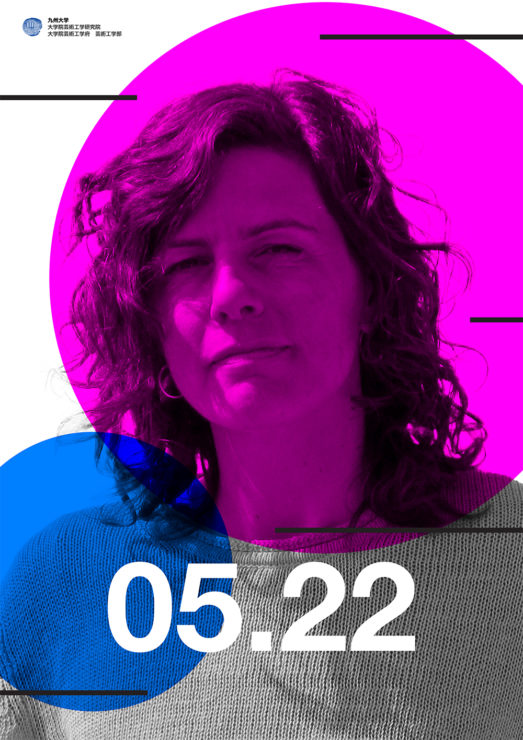
May 22, 2003: Talk+Workshop at Kyushu University, School of Design, Ohashi Campus, Fukuoka
Antonia Hirsch
February 28, 2023
Now in print and online: my conversation with Gregor Jansen, director of Kunsthalle Düsseldorf, for Maecenas, the quarterly publication by the Hessische Kulturstiftung
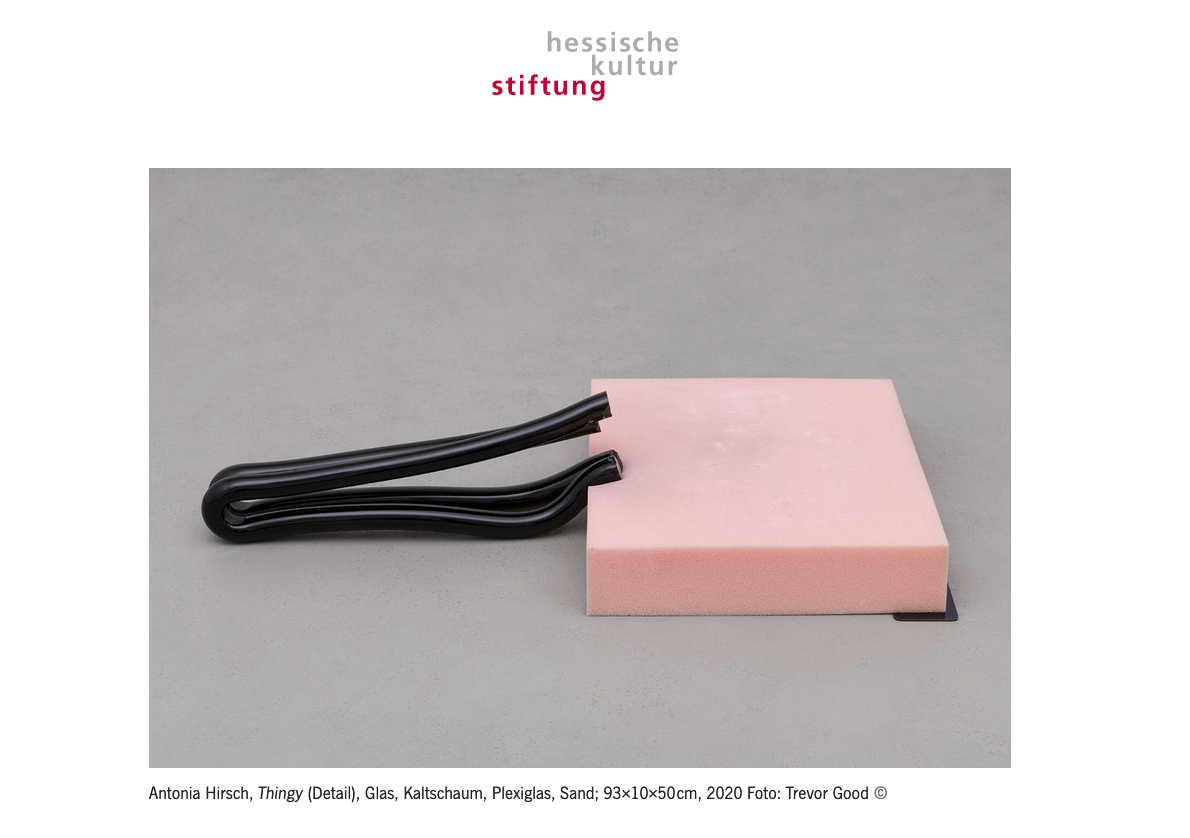 Antonia Hirsch
Antonia Hirsch
December 1, 2022
Running from December 2, 2022–February 12, 2023:
The Tide Is High
Kunsthaus Wiesbaden
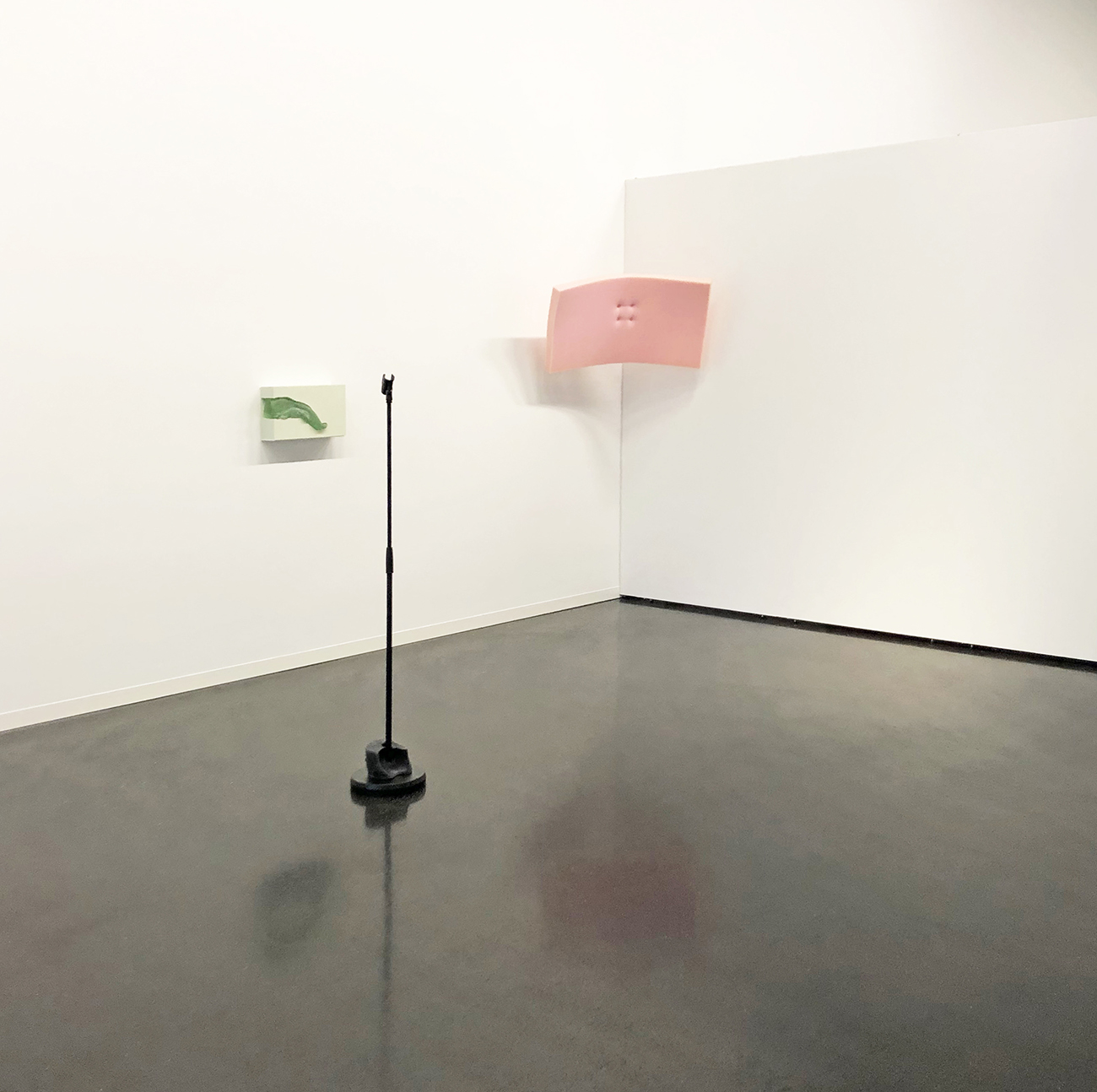


Curated by Sylvia Metz and Christin Müller
Antonia Hirsch
October 1, 2022
October 2022

Research Trip to Japan made possible thanks to a 2021 stipend by the Hessische Kulturstiftung and finally actually possible after Japan’s Covid restrictions were lifted.
Antonia Hirsch
July 1, 2022
Running from July 1–31, 2022
Note di Sguardi
Berlin * Bologna * Cervia


Conceived by the artist and curator Giovanna Sarti, Note di Sguardi is realized in collaboration with Sara Bernshausen in Berlin and Gino Gianuizzi in Bologna. Every year thirty-six artists, 12 artistic contributions from each city, are asked to select from their photographic archive an image that captures a fleeting moment and has specific meaning within their personal research. In the poster format 70×100 cm, three reproduced images, each from every city, are on display simultaneously for a month in Berlin, in Bologna, and in Cervia.
I encountered this salt lick in Vallunga, near Wolkenstein in South Tirol. I have recently been fascinated by the sheer formal beauty of these blocks of salt that have been licked into shape by animals. These “licking stations” seem to me a little like the animal-equivalent of an office’s water cooler. It’s a social node of sorts. The licking reminds me of how we physically activate other types of social junctions: by swiping and stroking our mobile devices we gain access to a digital social sphere.
Antonia Hirsch
December 6, 2021
Running from December 3, 2021–August 28, 2022:
Back to Future: Visions of Technologies between Fiction and Reality
Museum für Kommunikation, Berlin

Cosmic Night Shade © 2014, photography: Kay Herschelmann / MSPT
Artistic directors: Katja Weber, reflekt, and Yvonne Zindel
Artists: Aleksandra Domanović, ecoLogicStudio, Antonia Hirsch, Hyphen-Labs, Fabrice Monteiro, Suzanne Treister, Pinar Yoldas
Antonia Hirsch
November 11, 2021
New publication out now: ✨





Negative Space: Trajectories of Sculpture in the 20th and 21st Centuries.
Peter Weibel and Anett Holzheid (eds). Cambridge: The MIT Press, 2021.
Catalogue of the exhibition by the same name at ZKM in 2019.
Antonia Hirsch
April 9, 2021
Running from April 9–May 15, 2021
Technē
Republic Gallery, Vancouver

Antonia Hirsch
January 18, 2021
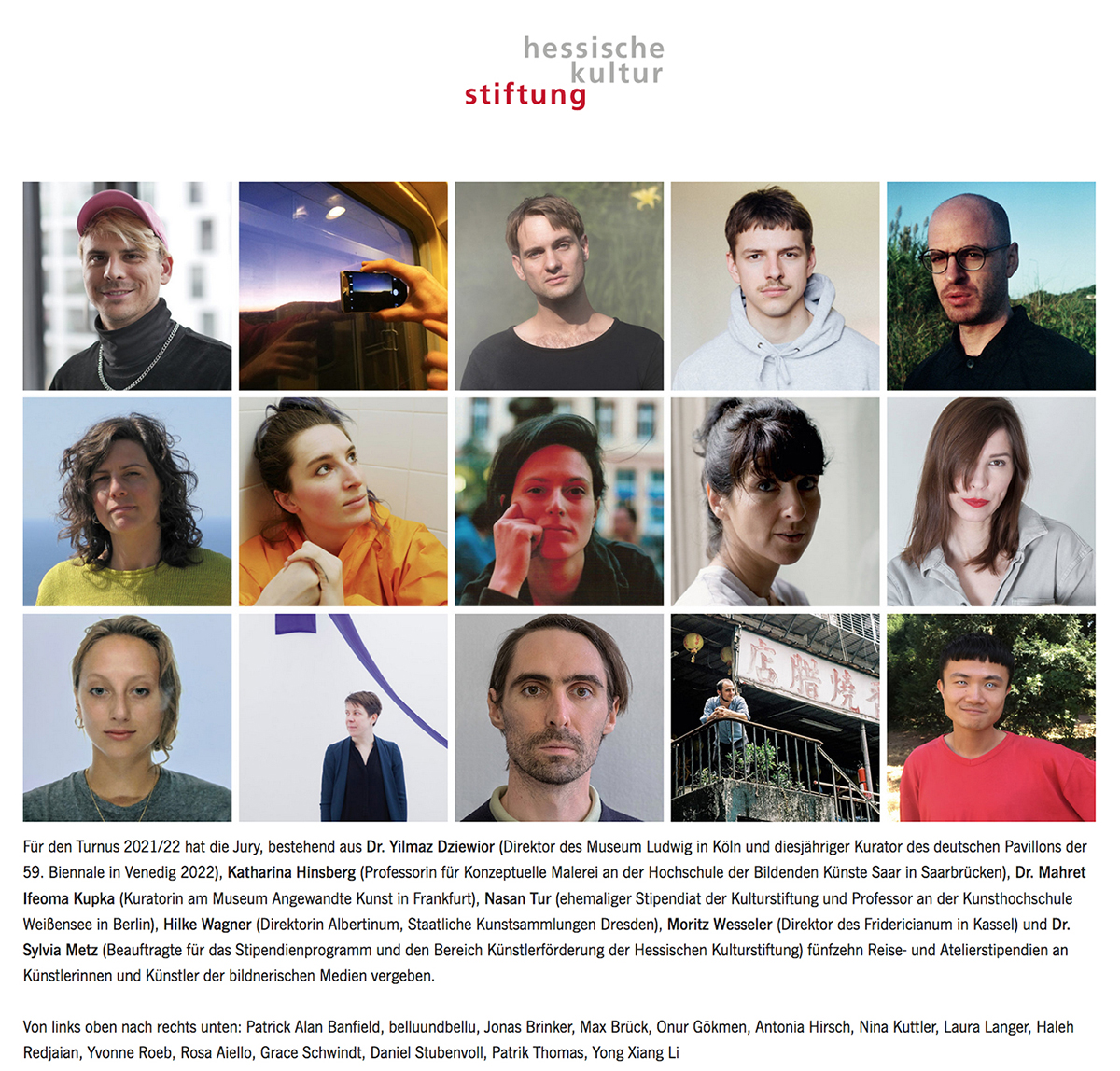
STIPENDIATIN 2021/22 / NEW FELLOW: ANTONIA HIRSCH / REISESTIPENDIUM / TRAVEL GRANT: JAPAN
EN
Born in Frankfurt am Main, Antonia Hirsch (*1968) explores in her sculptural practice the affective charge of objects.
In Japan, she will investigate design strategies that originally widely known as Kansei Engineering. This design approach particularly targets affects, for example in the design of a car whose radiator seems to smile.
In addition, the artist will explore traditional Japanese arts and crafts, their production, materiality, and ceremonial charge. She intends to incorporate the results into her artistic practice, in which she has been exploring the central motif of the screen.
DE
Die in Frankfurt am Main geborene Antonia Hirsch (*1968) setzt sich in ihrer skulpturalen Praxis mit der affektiven Aufladung von Objekten auseinander.
In Japan wird sie Designstrategien untersuchen, wie sie im Kansei Engeneering Anwendung finden. Dieses Design zielt besonders auf Affekte ab, so z.B. beim Entwurf eines Autos, dessen Kühler zu lächeln scheint.
Zudem wird sich die Künstlerin mit traditionellem japanischem Kunsthandwerk, dessen Produktion, Materialität und zeremonieller Aufladung befassen. Die Ergebnisse will sie in ihre künstlerische Praxis einfließen lassen, in der sie sich schon seit einigen Jahren mit dem zentralen Motiv des Screens auseinandersetzt.
Antonia Hirsch
December 18, 2020
Running from November 21–January 31, 2021
Cover Me
Ho Tam Press, Vancouver
 Antonia Hirsch
Antonia Hirsch
October 30, 2020
Opening November 17, 2020
Running from November 17–August 29, 2021
Back to Future
Museum für Kommunikation, Frankfurt am Main
 Antonia Hirsch, Cosmic Nightshade (2014)
Antonia Hirsch, Cosmic Nightshade (2014)
“Museum für Kommunikation in Frankfurt am Main has developed an exhibition, which highlights the technological utopias of the past and present. It particularly reflects on digitalisation and the social changes it has engendered, featuring selected works by internationally renowned artists like Antonia Hirsch, Aleksandra Domanović, Fabrice Monteiro, Suzanne Treister and Pinar Yoldas, alongside objects of technological history. Visitors embark on a visual journey passing four thematic rooms that introduces them to the technological models of the future, developed by the creative visionaries of the 19th century. Some of these utopias have become established models of everyday life, while others, though entertaining, clearly overshot their mark.
The artworks offer individual points of access to scientific history and provide alternative perspectives on technological innovations. In the piece by Pinar Yoldas, for example, visitors are given opportunities to consider the advantages (and disadvantages) of human optimisation. Entitled “Designer Babies” (2013-2016), her work reflects both the fascination and horror evoked by such themes as human-machine hybridisation, cyborgs and body extensions. In her installation „Cosmic Nightshade“ (2014), Antonia Hirsch simulates the other-worldly images of the asteroid 433 Eros that were sent to earth by a probe in 2000, thus capturing the human push into the unknown and sometimes threatening depths of the universe. The award-winning virtual reality installation „Neurospeculative Afrofeminism“ (2017) by the multi-disciplinary collective Hyphen-Labs introduces the visitors to a future in which women of color transcend the current intersectionality to become pioneers of neuroscience.” (Kulturstiftung des Bundes)
Artistic directors: Katja Weber, reflekt, and Yvonne Zindel
Artists: Aleksandra Domanović, ecoLogicStudio, Antonia Hirsch, Hyphen-Labs, Fabrice Monteiro, Suzanne Treister, Pinar Yoldas
Antonia Hirsch
August 1, 2020
 Goodbye old studio!
Goodbye old studio!
Antonia Hirsch
March 16, 2020




Work in progress.
Antonia Hirsch
February 28, 2020
Opening March 3, 2020
Running from March 3–May18, 2020
Awakening

Antonia Hirsch, World Map Project: Equal Countries A-Z (2006)
“In the spring of 2017, the Art Bank partnered with the Office of the Lieutenant Governor of Ontario on an exhibition tied to the United Nations Sustainable Development Goals (SDGs). Entitled Awakening, the exhibition featuring 21 artworks from the Canada Council Art Bank collection was curated by Bruce Mau.
An international tour of Awakening brought these thought-provoking pieces to places where significant debates about the health and sustainability of the planet were taking place, providing new perspectives and keeping these issues top of mind. In 2019, the exhibition travelled to the United Nations Headquarters in New York City, to the United Nations Headquarters in Geneva, and to the World Conference Centre in Bonn for the United Nations Global Climate Conference… Artists featured in this exhibition are Germaine Arnaktauyok, Iain Baxter&, Fernand Bergeron, Eleanor Bond, Edward Burtynsky, Sid Butt, Ken Danby, Randall Finnerty, Antonia Hirsch, Marilyn (Molly) Magid, Jimmy Manning, David Morris, Norval Morrisseau, Kim Ondaatje, Bruce Paton, David Rasmus, Michael Snow, Takao Tanabe, Joanne Tod, Chih-Chien Wang and Shirley Wiitasalo.”
Antonia Hirsch
February 12, 2020
 Arbeitsstipendium Stiftung Kunstfonds 2020!
Arbeitsstipendium Stiftung Kunstfonds 2020!
Antonia Hirsch
April 27, 2019
Opening April 27, 2019
Running from April 27–May 4, 2019
You Are—ontological positions around matter
Reinbeckhallen, Berlin
 Antonia Hirsch
Antonia Hirsch
April 21, 2019
Opening on April 23, 2019
Running from April 24–June 29, 2019
Absorbers
Decad, Berlin
 Antonia Hirsch
Antonia Hirsch
April 9, 2019
Running from April 6–August 11, 2019
Negative Space: Trajectories of Sculpture
ZKM Karlsruhe

Installation view of 16×9 (2017)
Antonia Hirsch
February 18, 2019
Opening Thursday, February 21, 2019:
INTOTO #7
Kunstverein Rosa Luxemburg Platz, Berlin

Antonia Hirsch
October 13, 2018
 Work in progress.
Work in progress.
Antonia Hirsch
June 29, 2018

Work in progress. Ex voto-personal device.
Antonia Hirsch
June 3, 2018
Running from May 26–August 18, 2018
zero, ground
Griffin Art Projects, North Vancouver
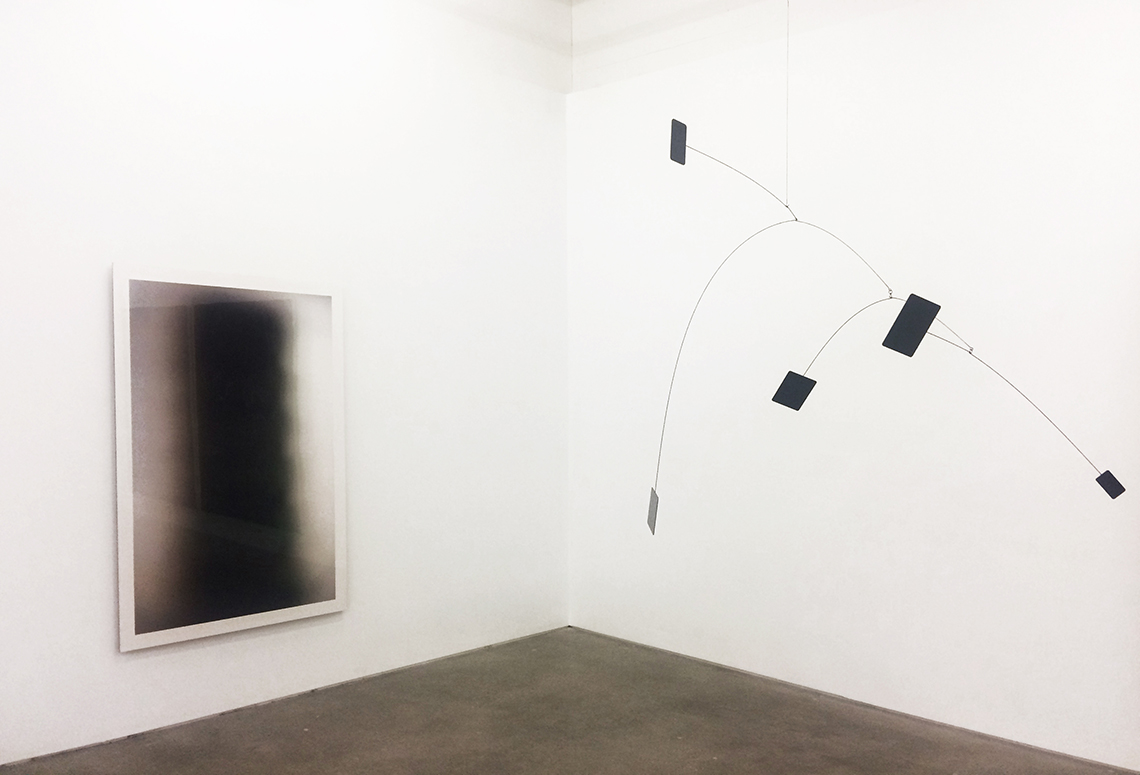
Installation view of the exhibiton zero, ground at Griffin Art Projects.
Left: Philipp Lachenmann, right: Antonia Hirsch mobilemobile I (2016).
Photography: Lee Plested.
Antonia Hirsch
May 14, 2018
 Glass research: bird’s eye view of a silica mine near Golden, British Columbia.
Glass research: bird’s eye view of a silica mine near Golden, British Columbia.
Antonia Hirsch
May 1, 2018
Opening Tuesday, May 1, 2018:
 For further information visit the exhibition’s website.
For further information visit the exhibition’s website.
Antonia Hirsch
April 12, 2018
Opening Saturday, April 14, 2018:
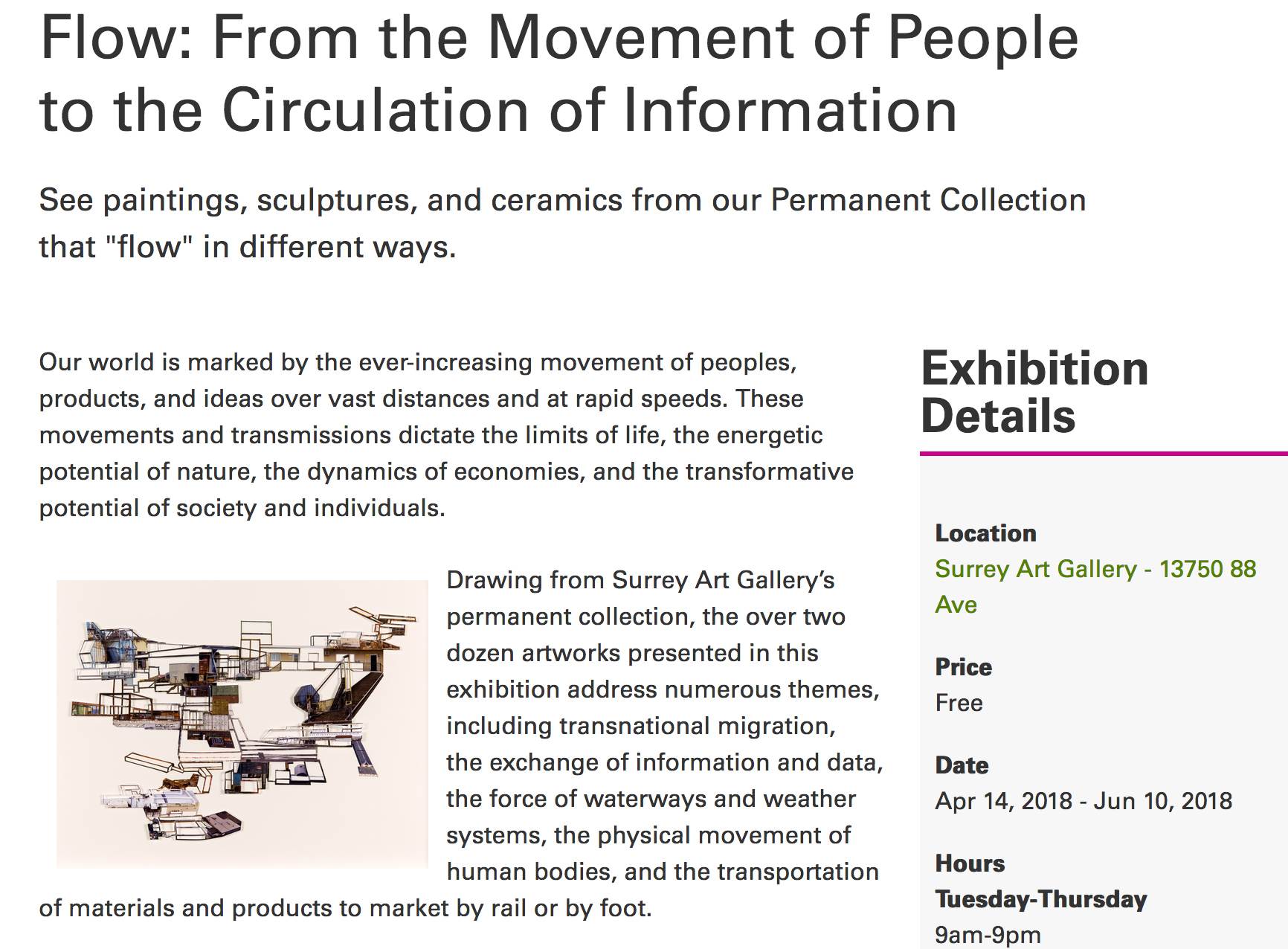
For further information visit the Surrey Art Gallery website
Antonia Hirsch
March 9, 2018
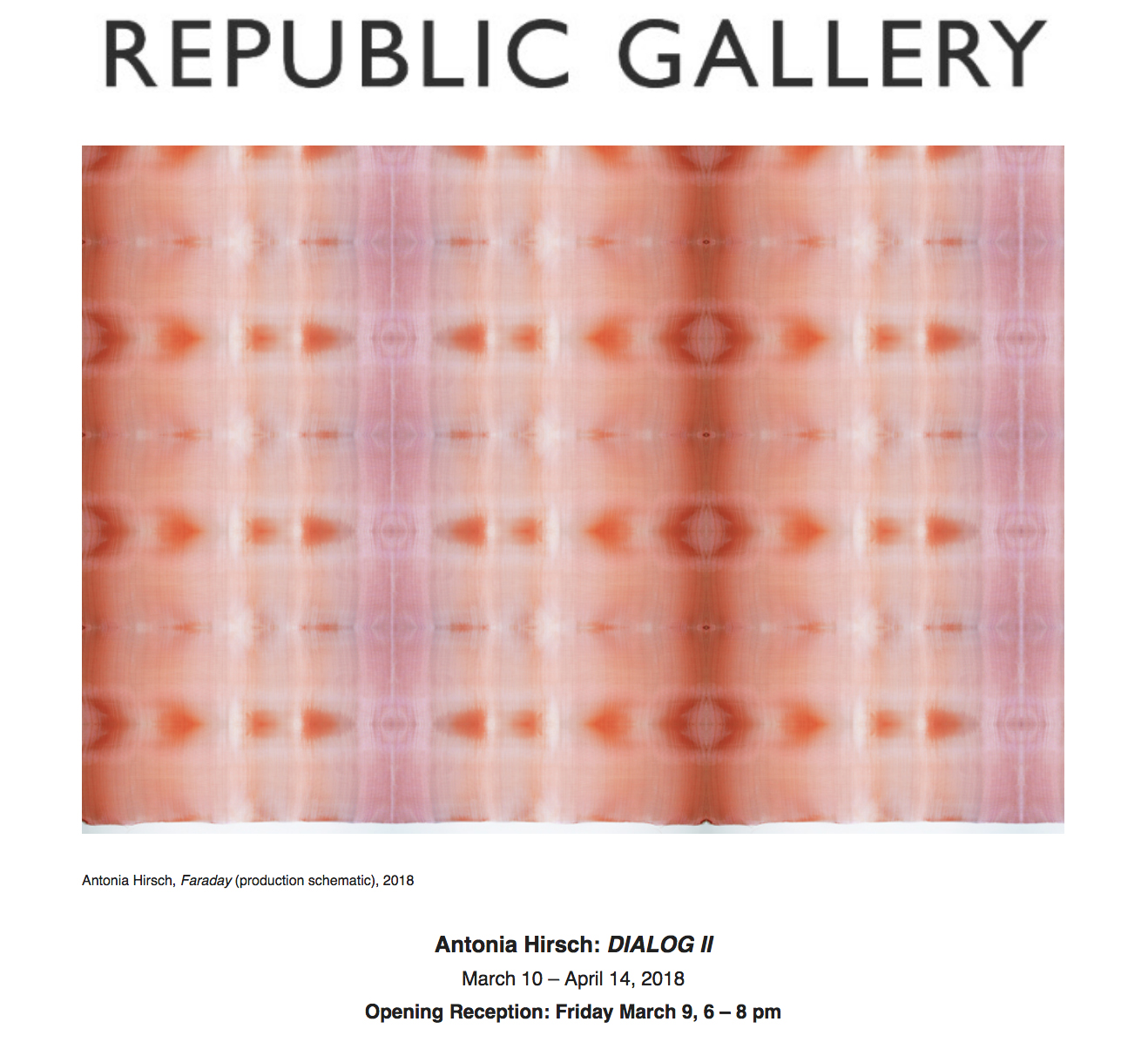 Antonia Hirsch
Antonia Hirsch
January 15, 2018
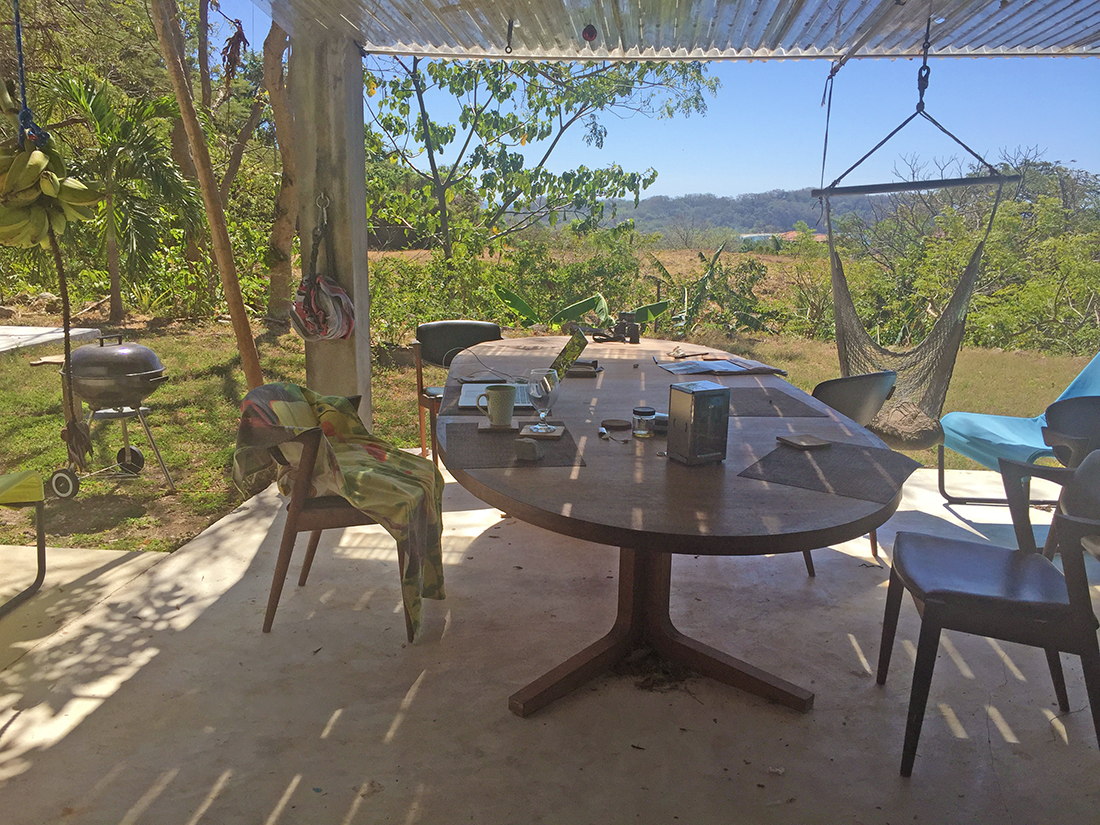
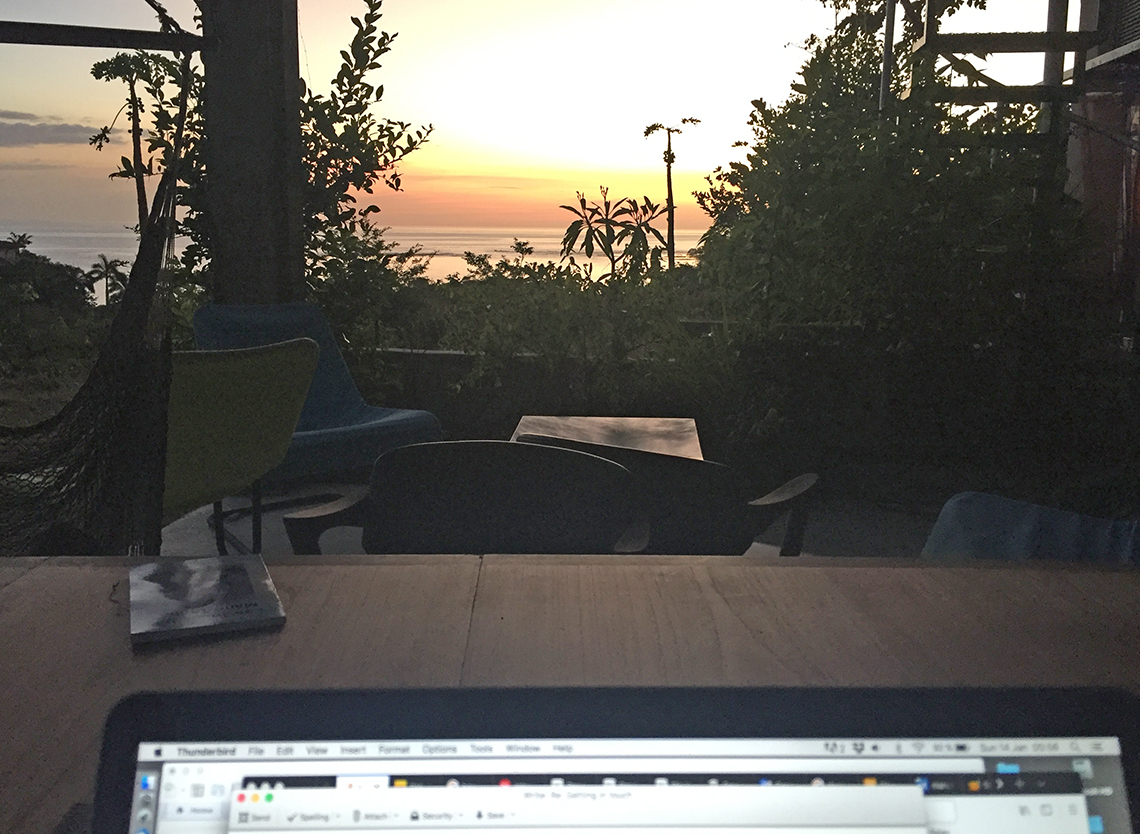
January residency at Orbitas—workspace with a view.
Antonia Hirsch
October 31, 2017
Gold ruby glass: this glass comes completely clear, but contains gold that with the right temperature and duration turns red.
Here’s the “before” picture: kiln packed with test in the foreground.
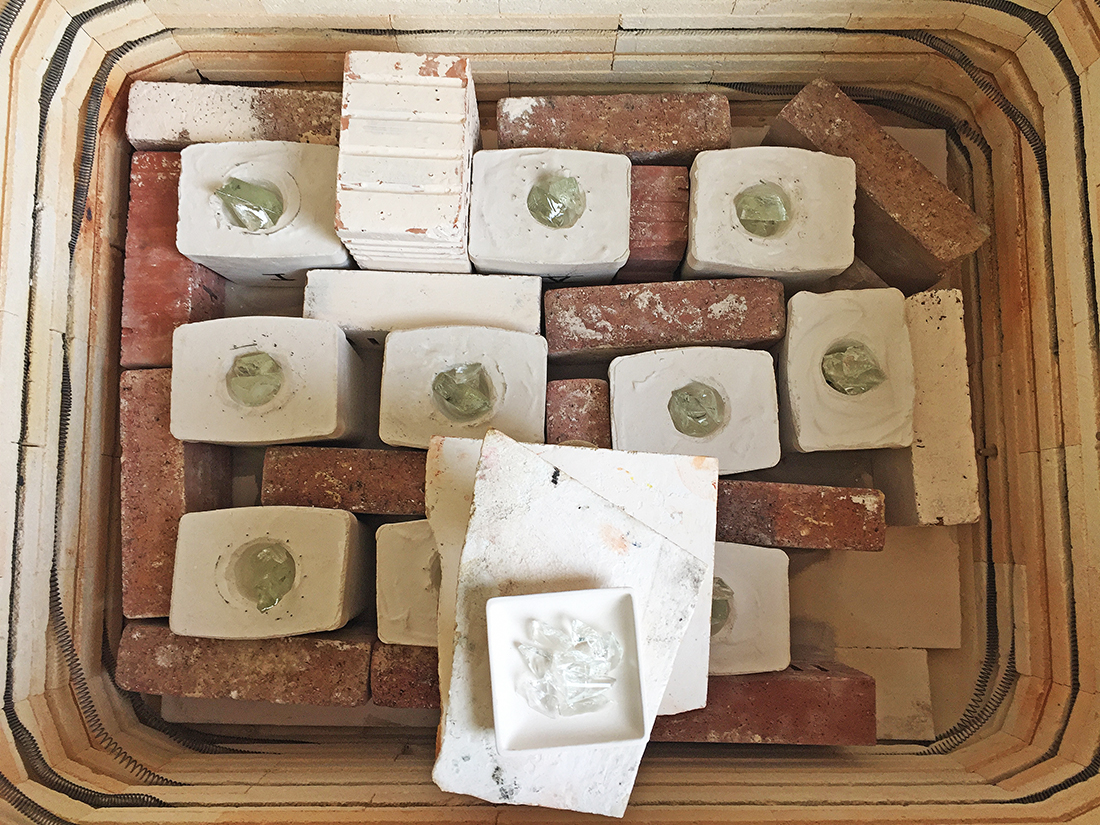
Here the test later in the process… it’s not there yet, a cool red: keep holding at 700 degrees.
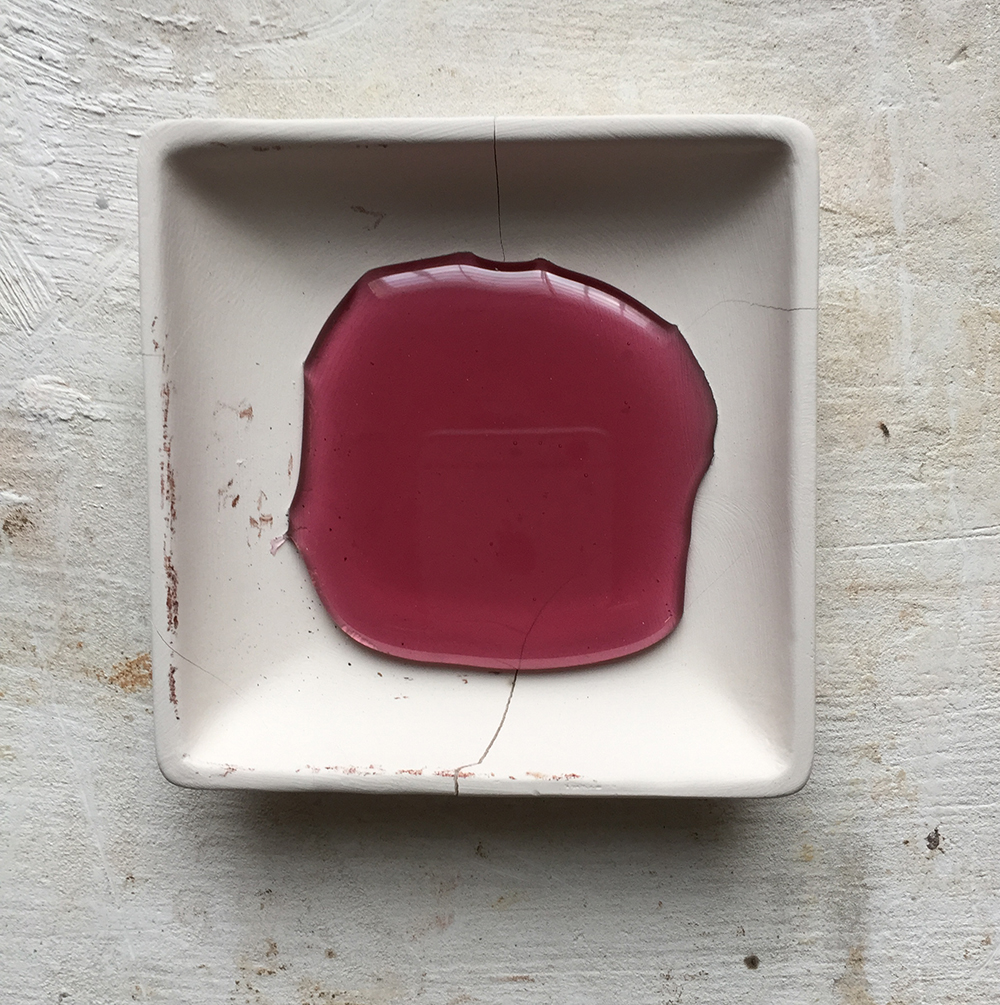
Proper gold ruby opening the kiln after the cool-down period:
 Antonia Hirsch
Antonia Hirsch
October 31, 2017
“Beyond [gold ruby glass’] aesthetic qualities, there is an alchemical connotation: Since ancient Greek times, descriptions of the sorcerers’ stone agree that it was believed to be a red substance and the key to the transmutation of metals, principally the making of gold. Whoever discovered how to color glass red must have thought himself to be on the right track to attaining the ultimate goal of alchemy… Red glass of some sort was produced almost from the time that glassmaking began. Knowledge was gained and then lost, and while there were rediscoveries on several occasions, this glass does not seem to have been produced again until it was revived in Brandenburg in the late 1670s and 1680s. It is here, with the arrival of the alchemist, pharmacist, and glassmaker Johann Kunckel (1637?–1703) in early 1678, that the real story of gold ruby glass begins.”
Source: Corning Museum of Glass
Antonia Hirsch
September 12, 2017
 The Surplus Library on Affect & Economic Exchange will be part of this fantastic Reading Room organized by Wendy’s Subway for the Brooklyn Academy of Music’s Next Wave Festival. The illustrious list of extraordinary (in the true sense of the word) libraries: Aeromoto (Mexico City); Aleph B° (Beirut); Ashkal Alwan (Beirut); AND (London); at land’s edge (Los Angeles); Beta-Local (Puerto Rico); Bureau of General Services—Queer Division (New York); CC Catálogo Contemporáneo (Mexico City and other locations); Chimurenga Library (Cape Town); dispersed holdings (New York); Feminist Library on Wheels (F.L.O.W.) at the Women’s Center for Creative Work (Los Angeles); Free Black Women’s Library (New York); Fundación Alumnos47 (Mexico City); Interference Archive (Brooklyn); Los Angeles Contemporary Archive (Los Angeles); P A L / Pilipinx American Library (Queens); Parmer (Brooklyn); Press Press (Baltimore); Provisions Library: A Project for Social Change (Fairfax and Washington D.C.); Reanimation Library (Queens); The Surplus Library on Affect and Economic Exchange (Multiple Locations); Temporary Services (Chicago); Vancouver Women’s Library (Vancouver); Ulises (Philadelphia); Yale Union (Portland)
The Surplus Library on Affect & Economic Exchange will be part of this fantastic Reading Room organized by Wendy’s Subway for the Brooklyn Academy of Music’s Next Wave Festival. The illustrious list of extraordinary (in the true sense of the word) libraries: Aeromoto (Mexico City); Aleph B° (Beirut); Ashkal Alwan (Beirut); AND (London); at land’s edge (Los Angeles); Beta-Local (Puerto Rico); Bureau of General Services—Queer Division (New York); CC Catálogo Contemporáneo (Mexico City and other locations); Chimurenga Library (Cape Town); dispersed holdings (New York); Feminist Library on Wheels (F.L.O.W.) at the Women’s Center for Creative Work (Los Angeles); Free Black Women’s Library (New York); Fundación Alumnos47 (Mexico City); Interference Archive (Brooklyn); Los Angeles Contemporary Archive (Los Angeles); P A L / Pilipinx American Library (Queens); Parmer (Brooklyn); Press Press (Baltimore); Provisions Library: A Project for Social Change (Fairfax and Washington D.C.); Reanimation Library (Queens); The Surplus Library on Affect and Economic Exchange (Multiple Locations); Temporary Services (Chicago); Vancouver Women’s Library (Vancouver); Ulises (Philadelphia); Yale Union (Portland)
Check out the details here.
Antonia Hirsch
August 9, 2017
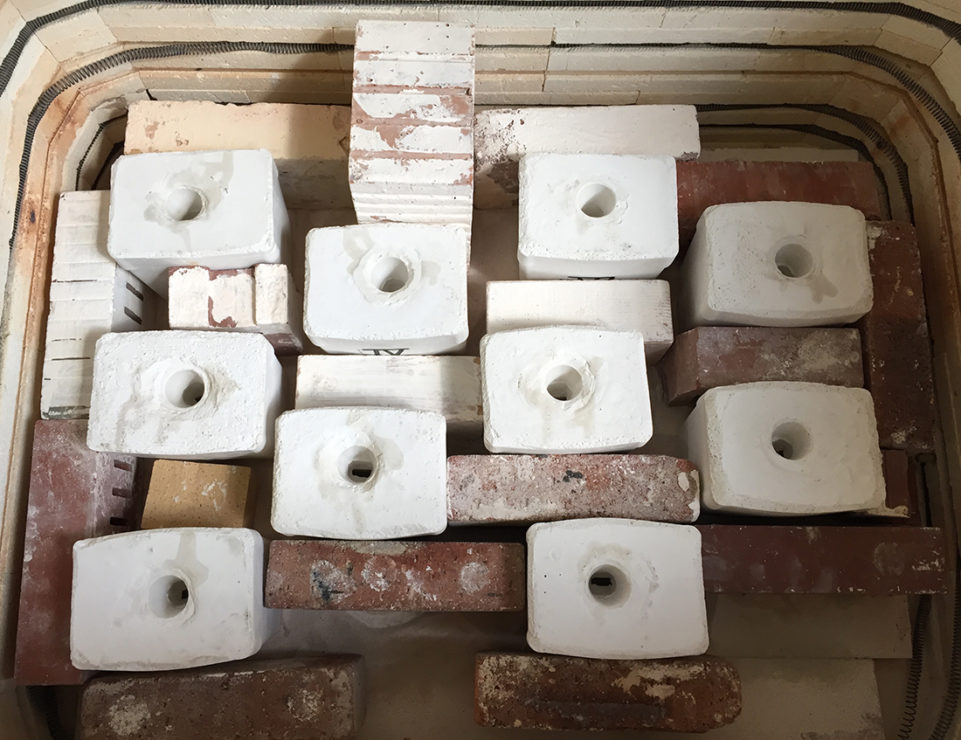 Here we go again: another set of molds packed for kiln casting, awaiting their crucibles and glass.
Here we go again: another set of molds packed for kiln casting, awaiting their crucibles and glass.
Antonia Hirsch
July 24, 2017
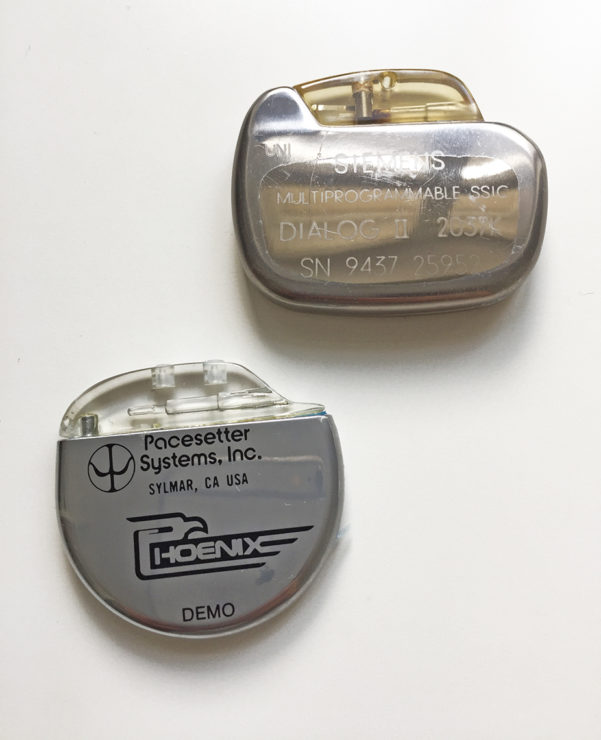 More raw material: two cardiac pacemakers, the “Phoenix” a demo, the “Dialog II” the real (and used) thing.
More raw material: two cardiac pacemakers, the “Phoenix” a demo, the “Dialog II” the real (and used) thing.
Antonia Hirsch
July 10, 2017
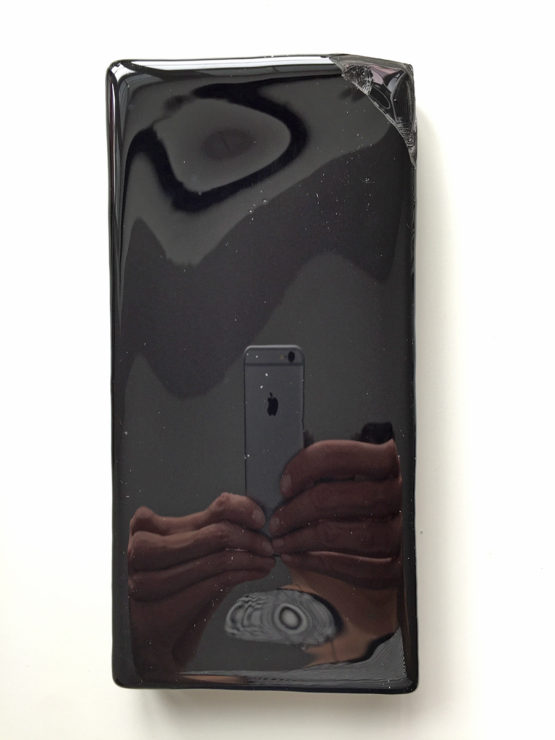 Raw material: black glass billet.
Raw material: black glass billet.
Antonia Hirsch
July 4, 2017
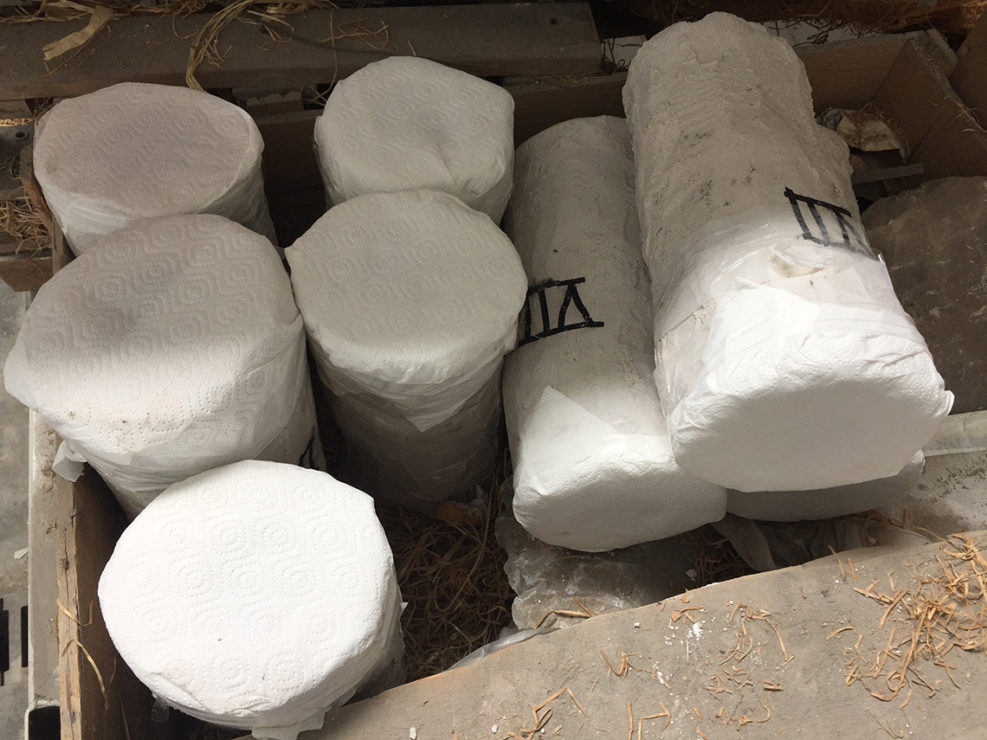 Next set of molds ready for the kiln.
Next set of molds ready for the kiln.
Antonia Hirsch
June 5, 2017
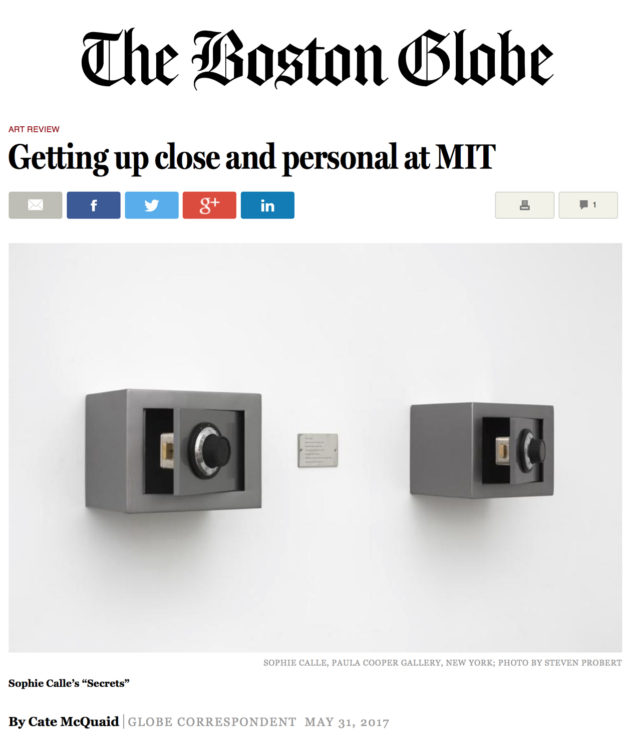 Click here for the article.
Click here for the article.
Antonia Hirsch
May 15, 2017
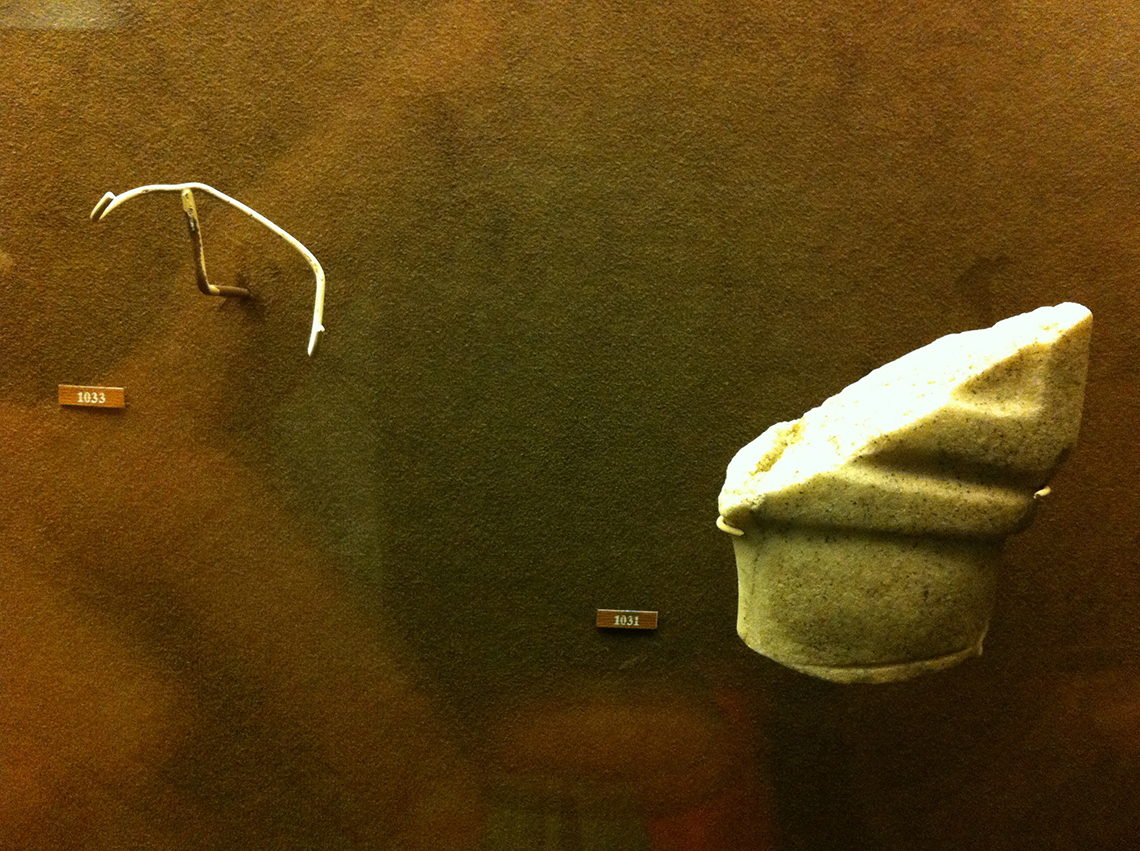
Shot from a display at the Museum of Cycladic Art in Athens.
Antonia Hirsch
April 28, 2017
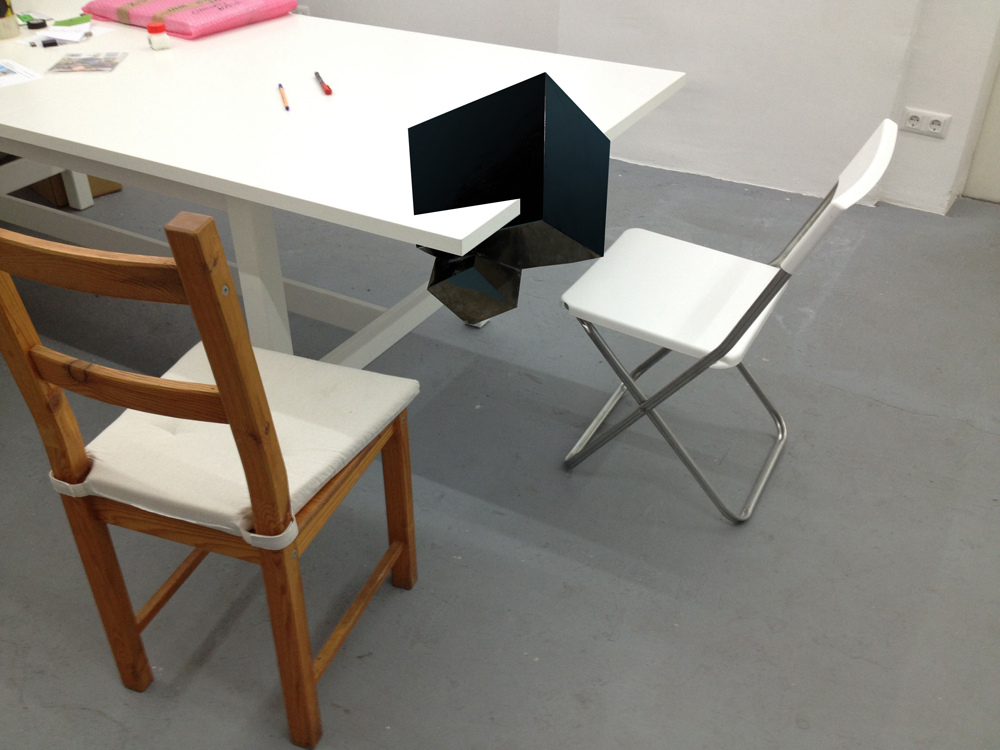
Above: sketch I made a couple of years ago and never realized.
Below: 16×9 (2017)
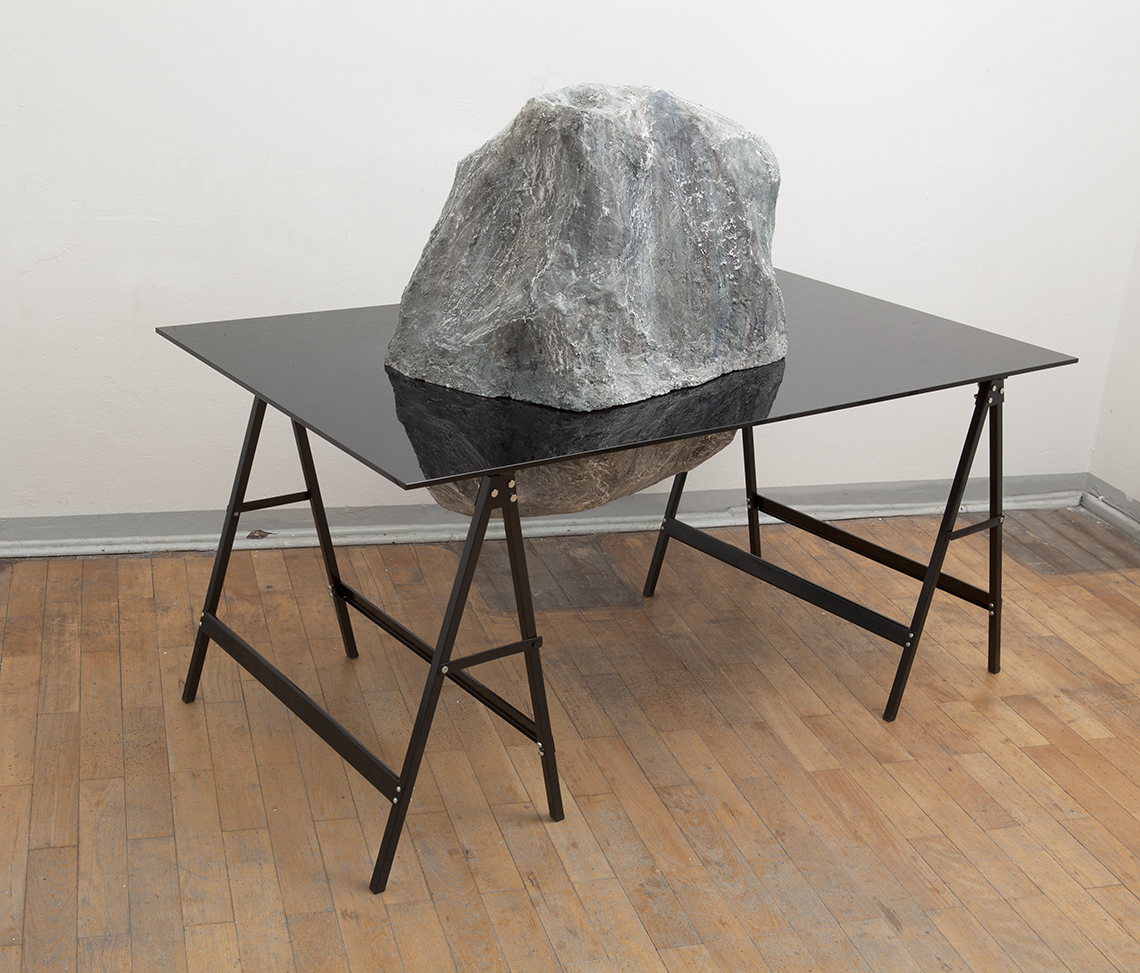 Antonia Hirsch
Antonia Hirsch
March 17, 2017

Form filled to the brim with black glass.
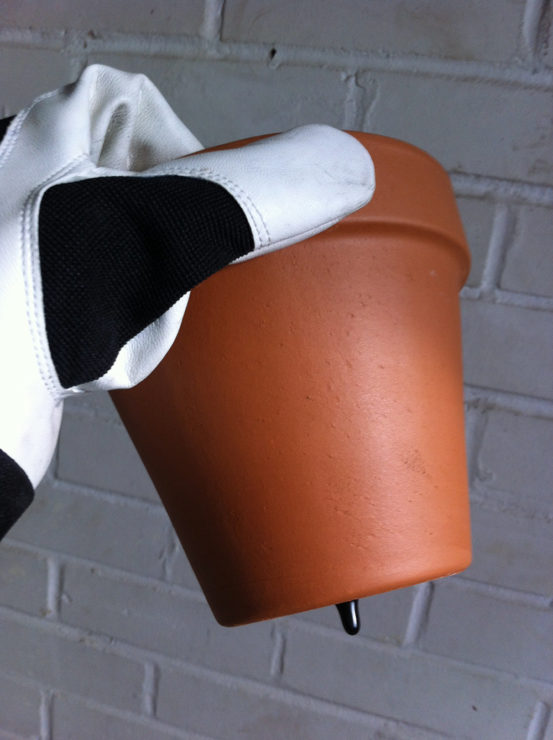
Glass drip frozen in mid-air…
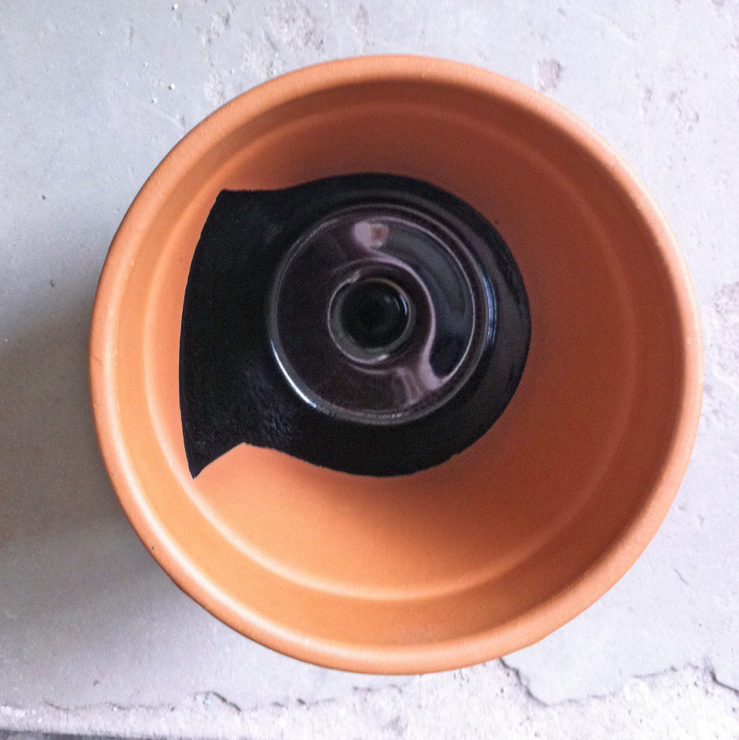
Glass billet’s “imprint” in the crucible…
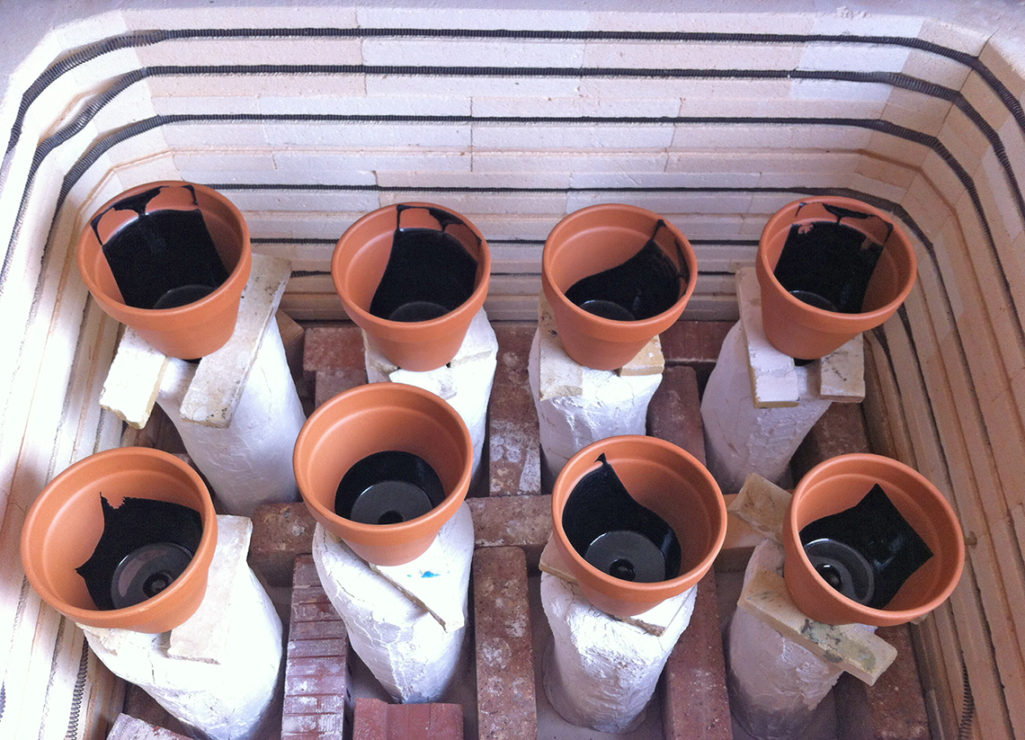
Behold: no broken molds and glass seems to have melted fully into the forms.
Antonia Hirsch
March 12, 2017
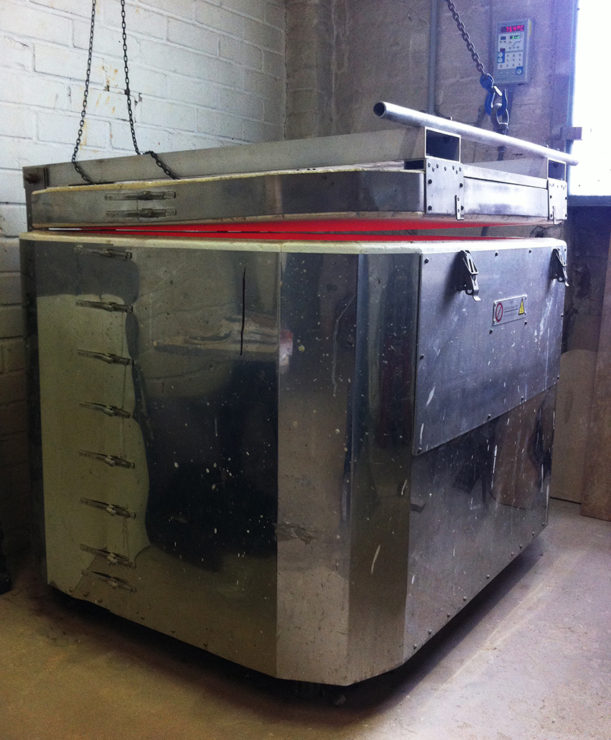
2hrs at 850° C when everything is glowing red hot, then venting the kiln to rapidly cool it down to 480° C. Then 40 more hours of cooling.
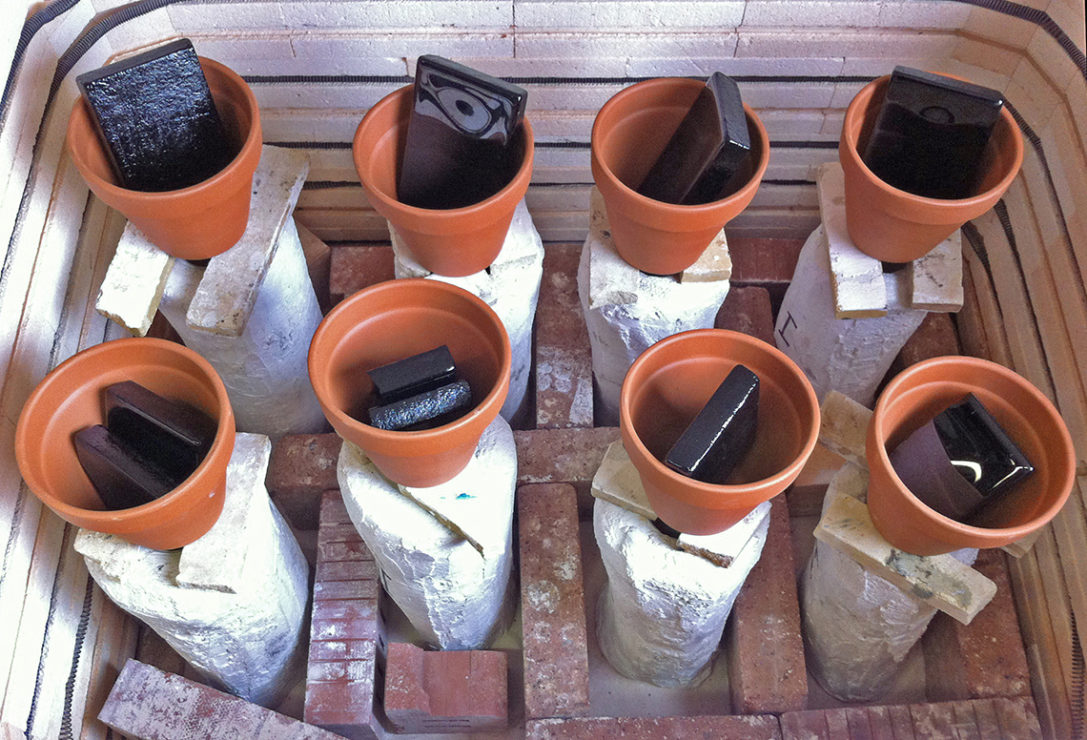
Inside of the kiln: forms at the bottom, buttressed with bricks and flower pots as crucibles with the black glass billets inside.
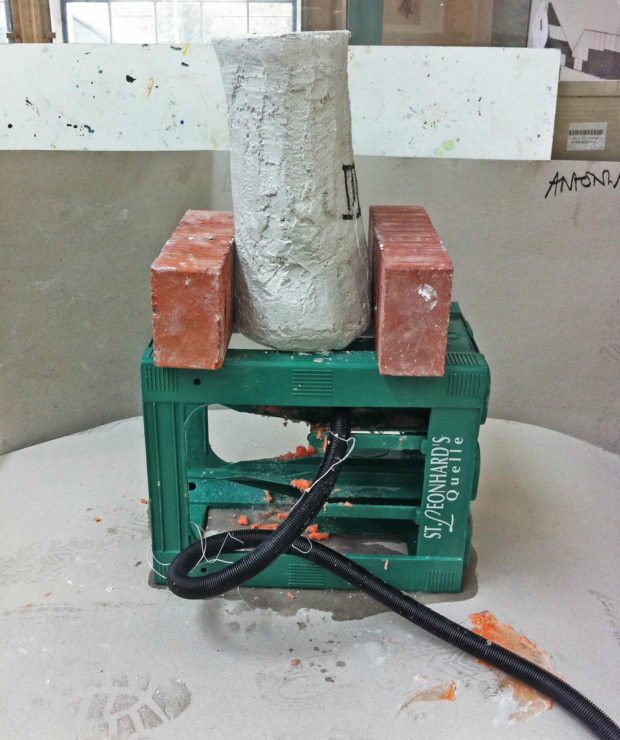 Not a DIY distillery, but my setup for steaming wax out of my molds.
Not a DIY distillery, but my setup for steaming wax out of my molds.
Antonia Hirsch
March 9, 2017
Opening today, March 9, 2017:
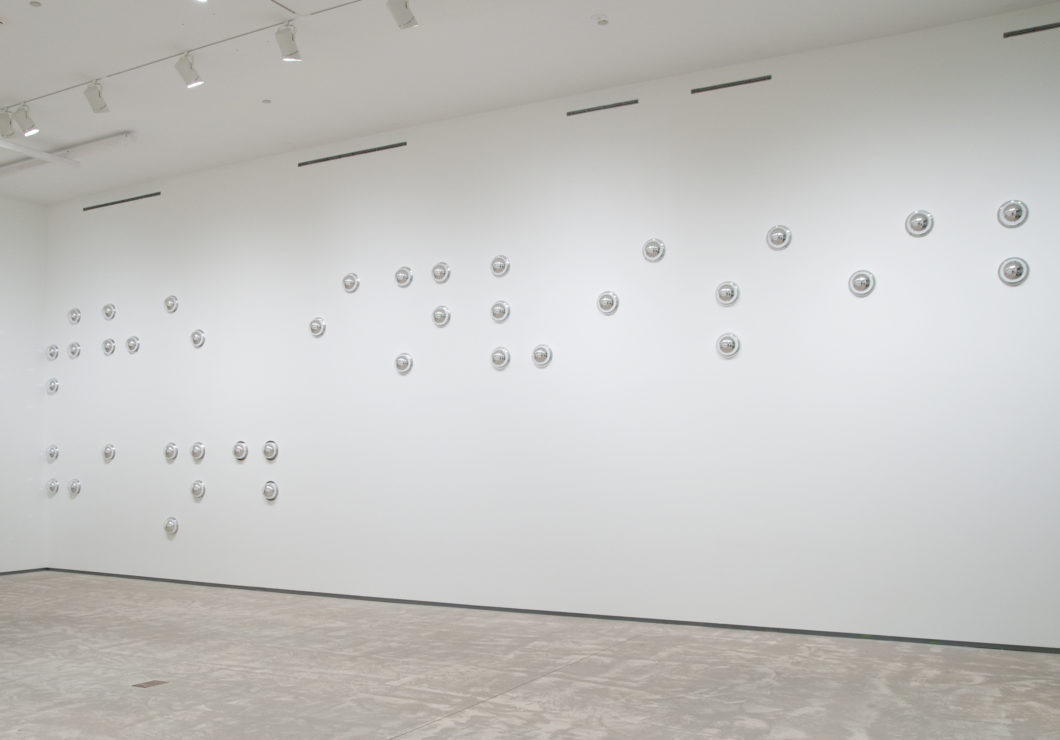
The Invisible Hand (After Adam Smith), installation view at the Agnes Etherington Art Centre, 2010
For further info visit Under Super Vision an exhibition and symposium at the University of British Columbia.
Antonia Hirsch
 Phenomenal Fracture is out! The book documents my solo exhibition Phenomenal Fracture at Kunsthalle Lingen (2024). With an essay by Meike Behm and exhibition photography by Roman Mensing. Designed by Adeline Morlon and published by DCV Books, Berlin.
Phenomenal Fracture is out! The book documents my solo exhibition Phenomenal Fracture at Kunsthalle Lingen (2024). With an essay by Meike Behm and exhibition photography by Roman Mensing. Designed by Adeline Morlon and published by DCV Books, Berlin.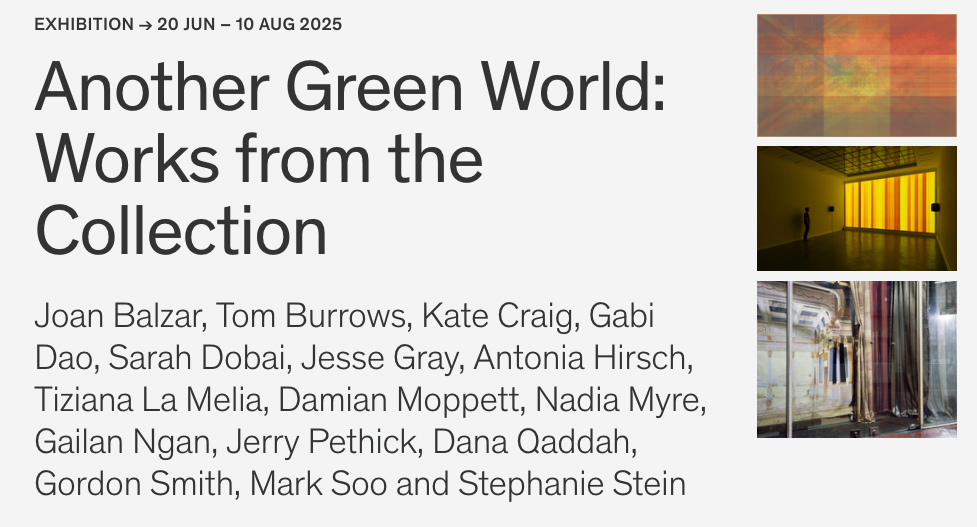

 Search Engine by Antonia Hirsch launches at
Search Engine by Antonia Hirsch launches at 

 Sunday, April 28, 2024 at 4.30 pm
Sunday, April 28, 2024 at 4.30 pm



















 Antonia Hirsch, Cosmic Nightshade (2014)
Antonia Hirsch, Cosmic Nightshade (2014) Goodbye old studio!
Goodbye old studio!




 Arbeitsstipendium Stiftung Kunstfonds 2020!
Arbeitsstipendium Stiftung Kunstfonds 2020!



 Work in progress.
Work in progress.

 Glass research: bird’s eye view of a silica mine near Golden, British Columbia.
Glass research: bird’s eye view of a silica mine near Golden, British Columbia.







 The Surplus Library on Affect & Economic Exchange will be part of this fantastic Reading Room organized by Wendy’s Subway for the Brooklyn Academy of Music’s Next Wave Festival. The illustrious list of extraordinary (in the true sense of the word) libraries: Aeromoto (Mexico City); Aleph B° (Beirut); Ashkal Alwan (Beirut); AND (London); at land’s edge (Los Angeles); Beta-Local (Puerto Rico); Bureau of General Services—Queer Division (New York); CC Catálogo Contemporáneo (Mexico City and other locations); Chimurenga Library (Cape Town); dispersed holdings (New York); Feminist Library on Wheels (F.L.O.W.) at the Women’s Center for Creative Work (Los Angeles); Free Black Women’s Library (New York); Fundación Alumnos47 (Mexico City); Interference Archive (Brooklyn); Los Angeles Contemporary Archive (Los Angeles); P A L / Pilipinx American Library (Queens); Parmer (Brooklyn); Press Press (Baltimore); Provisions Library: A Project for Social Change (Fairfax and Washington D.C.); Reanimation Library (Queens); The Surplus Library on Affect and Economic Exchange (Multiple Locations); Temporary Services (Chicago); Vancouver Women’s Library (Vancouver); Ulises (Philadelphia); Yale Union (Portland)
The Surplus Library on Affect & Economic Exchange will be part of this fantastic Reading Room organized by Wendy’s Subway for the Brooklyn Academy of Music’s Next Wave Festival. The illustrious list of extraordinary (in the true sense of the word) libraries: Aeromoto (Mexico City); Aleph B° (Beirut); Ashkal Alwan (Beirut); AND (London); at land’s edge (Los Angeles); Beta-Local (Puerto Rico); Bureau of General Services—Queer Division (New York); CC Catálogo Contemporáneo (Mexico City and other locations); Chimurenga Library (Cape Town); dispersed holdings (New York); Feminist Library on Wheels (F.L.O.W.) at the Women’s Center for Creative Work (Los Angeles); Free Black Women’s Library (New York); Fundación Alumnos47 (Mexico City); Interference Archive (Brooklyn); Los Angeles Contemporary Archive (Los Angeles); P A L / Pilipinx American Library (Queens); Parmer (Brooklyn); Press Press (Baltimore); Provisions Library: A Project for Social Change (Fairfax and Washington D.C.); Reanimation Library (Queens); The Surplus Library on Affect and Economic Exchange (Multiple Locations); Temporary Services (Chicago); Vancouver Women’s Library (Vancouver); Ulises (Philadelphia); Yale Union (Portland) Here we go again: another set of molds packed for kiln casting, awaiting their crucibles and glass.
Here we go again: another set of molds packed for kiln casting, awaiting their crucibles and glass. More raw material: two cardiac pacemakers, the “Phoenix” a demo, the “Dialog II” the real (and used) thing.
More raw material: two cardiac pacemakers, the “Phoenix” a demo, the “Dialog II” the real (and used) thing. Raw material: black glass billet.
Raw material: black glass billet. Next set of molds ready for the kiln.
Next set of molds ready for the kiln.




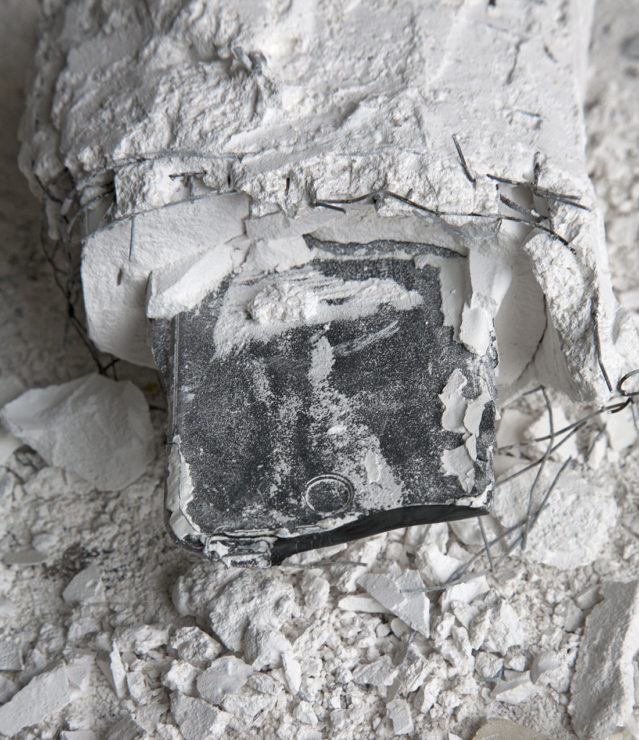
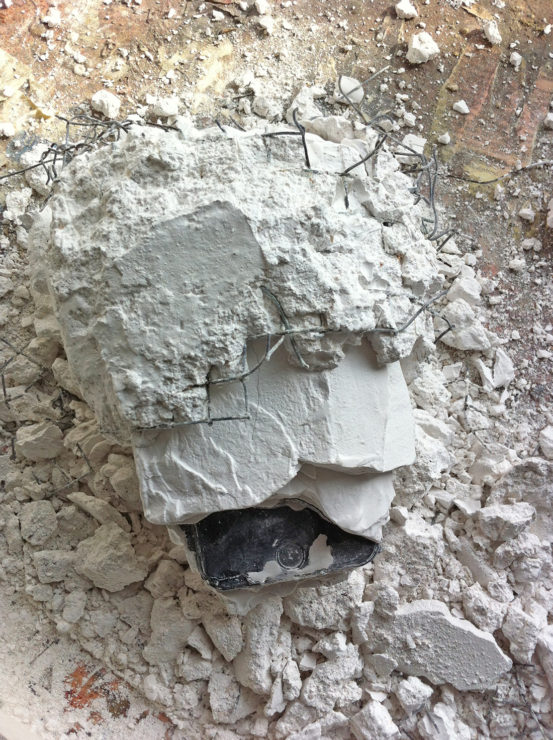
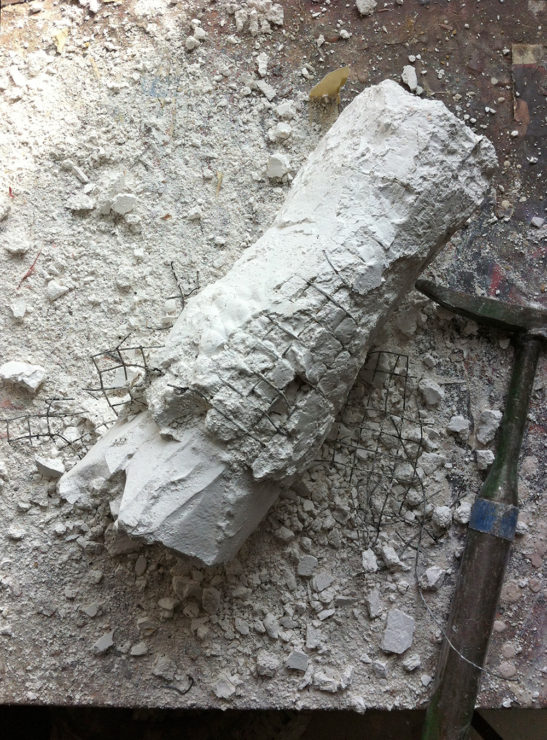






 Not a DIY distillery, but my setup for steaming wax out of my molds.
Not a DIY distillery, but my setup for steaming wax out of my molds.